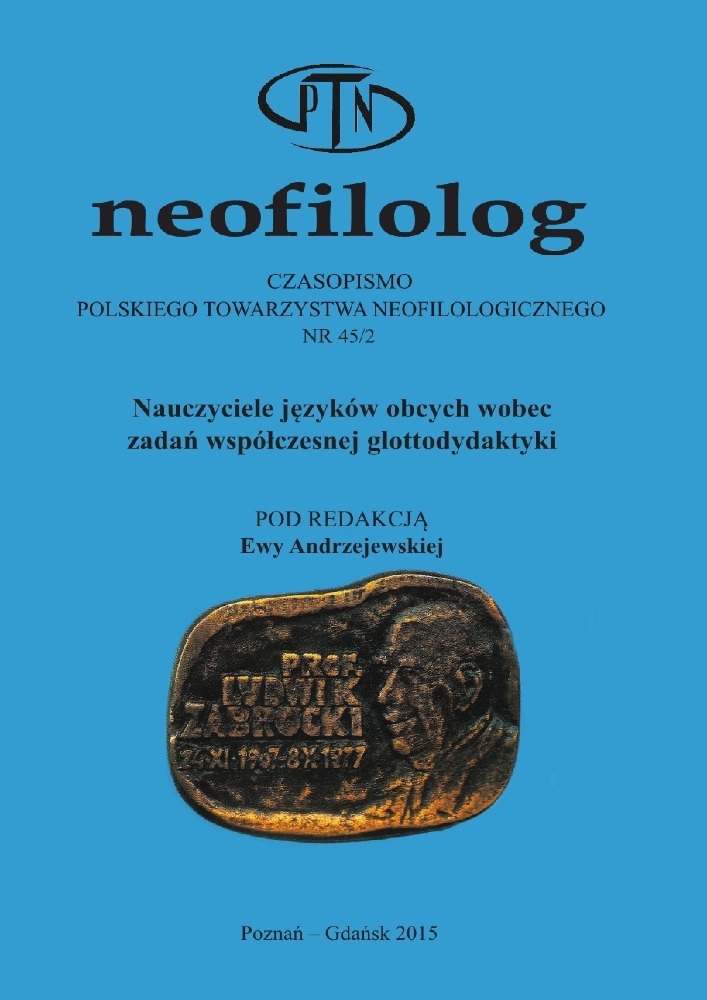Abstrakt
Willingness to communicate (WTC) in a second language is the outcomeof mutual influences of a wide array of psychological, linguistic, educational
and communicative factors, including those that are dependent
on a specific situation, such as the character of a particular class or the
task being performed. All of them can increase or decrease the level of
WTC on a minute-by-minute basis (MacIntyre and Legatto, 2011). The
aim of the study presented in this paper was to obtain greater insights
into the motives underlying willingness and unwillingness to take part
in a conversation in a foreign language with a view to creating in the
language classroom conditions that would stimulate communication
and thus contribute to the attainment of greater proficiency. More specifically,
an attempt was made to determine and measure factors affecting
WTC in one group of English majors, as they were engaged in a conversation
class. The data were collected by means of self-reports, completed
during the class, in which the levels of WTC were indicated on
a scale of -10 to +10, as well as short questionnaires filled in right afterwards.
A combination of quantitative and qualitative analysis showed
that WTC in a conversation class is subject to constant fluctuations and
made it possible to identify factors responsible for such changes.
Bibliografia
Andrews, S. 2007. Teacher language awareness. Cambridge: Cambridge University Press.
Bartels, N. 2009. „Knowledge about language” (w) The Cambridge guide to second language teacher education (red. A. Burns, J. C. Richards). Cambridge: Cam-bridge University Press: 125-134.
Borg, S. 2013. „Language teacher education” (w) The Routledge handbook of applied linguistics (red. J. Simpson). London and New York: Routledge: 215-228.
Canale, M. 1983. „From communicative competence to communicative language peda-gogy” (w) Language and communication (red. J. C. Richards, R. W. Schmidt). London: Longman: 2-27.
Canale, M., Swain, M. 1980. „Theoretical bases of communicative approaches to second language teaching and testing.” Applied Linguistics 1: 1-47.
Coste, D., North, B., Sheils, J., Trim, J. 2003. Europejski system opisu kształcenia języ-kowego: uczenie się, nauczanie, ocenianie. Warszawa: Wydawnictwa Centralne-go Ośrodka Kształcenia Nauczycieli.
Ellis, R. 2009. „Implicit and explicit learning, knowledge and instruction” (w) Implicit and explicit knowledge in second language learning, testing and teaching (red. R. Ellis,
S. Loewen, C. Elder, R. Erlam, J. Philp i H. Reinders). Bristol: Multilingual Matters: 3-25.
Farrell, T. S. C. 2007. Reflective language teaching: From research to practice. London: Continuum.
Freeman, D. 2001. „Second language teacher education” (w) The Cambridge guide to teaching English to teachers of other languages (red. R. Carter, D. Nunan). Cambridge: Cambridge University Press: 72-79.
Freeman, D., Johnson, K. E. 2005. „Towards linking teacher knowledge and student learning” (w) Second language teacher education: International perspectives (red. D. Tedick). Mahwah: NJ. Lawrence Erlbaum: 73-95.
Graves, K. 2009. „The curriculum of second language teacher education” (w) The Cam-bridge guide to second language teacher education (red. A. Burns, J. C. Rich-ards). Cambridge: Cambridge University Press: 115-125.
Jourdenais, R. 2009. „Language teacher education” (w) The handbook of language teaching (red. M. H. Long, C. J. Doughty). Oxford: Wiley-Blackwell: 647-658.
Kelly, M., Grenfell, M. 2004. European profile for language teacher education. A frame of reference. Southampton: University of Southampton.
Lafayette, R. 1993. „Subject matter content: What every foreign language teacher needs to know” (w) Developing language teachers for a changing world (red. G. Gun-termann). Illinois: National Textbook Company: 124-158.
Medgyes, P. 2001. „When the teacher is a non-native speaker” (w) Teaching English as a second or foreign language (red. M. Celce-Murcia). Boston: Heinle & Heinle: 415-427.
Morton, T., Maguire, T., Baynham, M. 2006. A literature review of research on teacher education in adult literacy, numeracy and ESOL. London: NRDC.
Mystkowska-Wiertelak, A., Pawlak, M. 2014. “Fluctuations in learners’ willingness to communicate during communicative task performance: Conditions and tendencies”. [w:] Research in Language 12. doi 10.2478/rela-2014-0019
Pawlak, M. 2010. „Problemy pomiaru wiedzy językowej”. Neofilolog 35: 9-22.
Pawlak, M., Mystkowska-Wiertelak. 2015. “Investigating the dynamic nature of L2 learners’ willingness to communicate”, System 50: 1-9.
Richards, J. C. 1998. Beyond training. Cambridge: Cambridge University Press.
Richards, J. C., Lockhart, C. 1994. Reflective teaching in second language classrooms. Cambridge: Cambridge University Press.
Rozporządzenie Ministra Nauki i Szkolnictwa Wyższego z dnia 17 stycznia 2012 r. w sprawie standardów kształcenia przygotowującego do wykonywania zawodu nauczyciela.
Roberts, J. 1998. Language teacher education. London: Arnold.
Waters, A. 2005. „Expertise in teacher education” (w) Expertise in second language learning and teaching (red. K. Johnson). New York: Palgrave Macmillan: 201-229.
Licencja
Prawa autorskie (c) 2019 Mirosław Pawlak, Anna Mystkowska-Wiertelak

Utwór dostępny jest na licencji Creative Commons Uznanie autorstwa – Bez utworów zależnych 4.0 Międzynarodowe.
Przedstawiany utwór (artykuł) upubliczniany jest na podstawie umowy z autorem i na licencji Creative Commons Attribution-NoDerivatives 4.0 International (CC BY-ND 4.0).
Użytkownicy mają obowiązek podania wraz z rozpowszechnionym utworem, informacji o autorstwie, tytule, źródle (odnośniki do oryginalnego utworu, DOI) oraz samej licencji;
- bez tworzenia utworów zależnych,
- utwór musi być zachowany w oryginalnej postaci.
Uniwersytet im. Adama Mickiewicza w Poznaniu zachowuje prawo do czasopisma jako całości (układ, forma graficzna, tytuł, projekt okładki, logo itp.).
